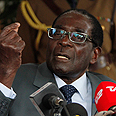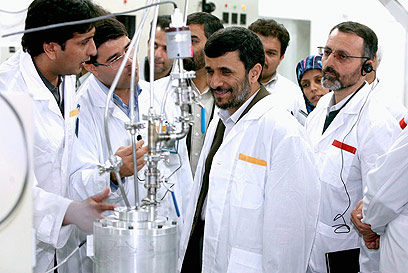
Report: Zimbabwe agrees to sell uranium to Iran
Despite years of denials, Zimbabwean official says country signed secret deal with Islamic Republic to supply it with uranium, raw materials needed for nuclear arms, breeching international sanctions, British Times reported
"I have seen (a memorandum of understanding) to export uranium to the Iranians," Zimbabwean Deputy Mining Minister Gift Chimanikire told the British newspaper.
Related stories:
- Rohani: Iran prepared for negotiations on nuclear issue
- Report: Iran hunts for uranium
- Report: Iran buying uranium from Zimbabwe
The agreement, which was reportedly signed last year, is likely to cause alarm in Western capitals. The United States and the European Union have imposed crippling sanctions on Iran over its nuclear program, which Tehran insists is for peaceful energy uses but which they fear is intended to build a bomb.
Zimbabwe is also subject to international sanctions over its human rights record and conduct of elections.
President Robert Mugabe, who won another five-year term in disputed polls last month, has publicly backed Iran's nuclear drive.
During a visit by Iran's then president, Mahmoud Ahmadinejad, to Harare in April 2010, Mugabe said his guest should be assured of "Zimbabwe's continuous support of Iran's just cause on the nuclear issue" and reports emerged that year of a uranium deal between the two nations. However, Mugabe has also gone to lengths to deny his country is supplying Iran with uranium.

Ahmadinejad in Natanz plant. Archive. (Photo: EPA)
In 2011, an intelligence report from a member country of the International Atomic Energy Agency - shared with the AP by an official from that nation – said that the Iranian foreign minister at the time, Ali Akbar Salehi, had met secretly with senior Zimbabwean mining officials "to resume negotiations ... for the benefit of Iran's uranium procurement plan."
Chimanikire is a member of Zimbabwe's opposition who is likely to be replaced now that the election has brought an end to the shaky coalition government.
He said the uranium deal had been made without his knowledge, and was only known to a handful of people at the top of the government.
Despite the agreement, The Times reported analysts as saying that it was likely to be a long time before Zimbabwe's uranium reserves were ready for export.
Last week, Iranian President Hassan Rohani said Iran is prepared to enter "serious and substantive" negotiations on nuclear issue. He added that confident concerns of both sides regarding the nuclear issue can be removed in a short time.
The solution to the nuclear issue, Rohani stressed, could be reached "solely through talks, not threats," noting he was "seriously determined" not only to resolve the nuclear issue, but also to preserve Iran's rights, among them the "undeniable right" to enrich uranium, and address the other side's concerns.
The Associated Press and Reuters contributed to this report










